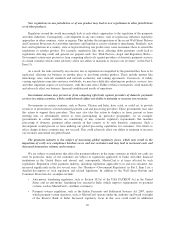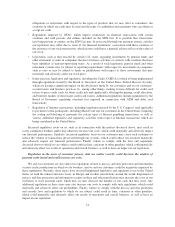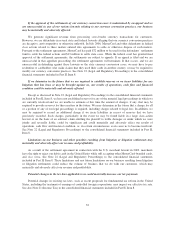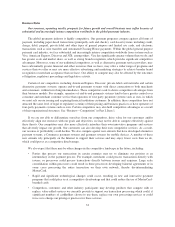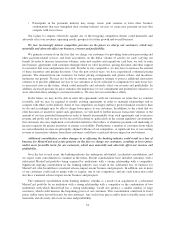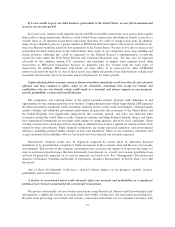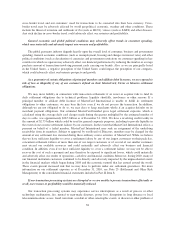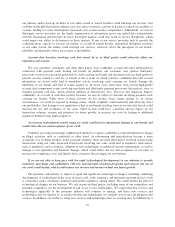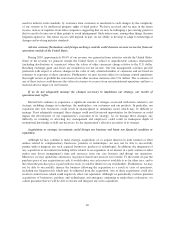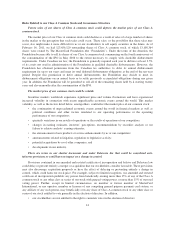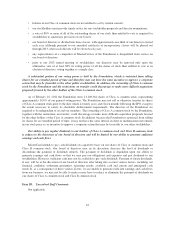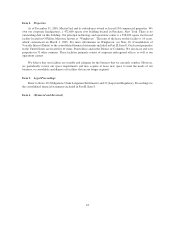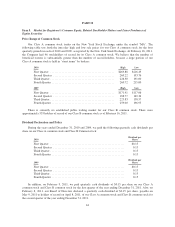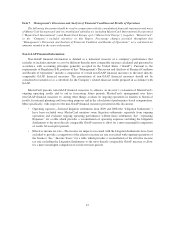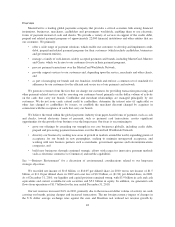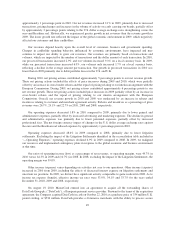MasterCard 2010 Annual Report Download - page 49
Download and view the complete annual report
Please find page 49 of the 2010 MasterCard annual report below. You can navigate through the pages in the report by either clicking on the pages listed below, or by using the keyword search tool below to find specific information within the annual report.our primary and/or back-up facilities or our other owned or leased facilities could interrupt our services. Our
visibility in the global payments industry may also attract terrorists, activists or hackers to attack our facilities or
systems, leading to service interruptions, increased costs or data security compromises. Additionally, we rely on
third-party service providers for the timely transmission of information across our global data transportation
network. Inadequate infrastructure in lesser developed markets could also result in service disruptions, which
could impact our ability to do business in those markets. If one of our service providers fails to provide the
communications capacity or services we require, as a result of natural disaster, operational disruption, terrorism
or any other reason, the failure could interrupt our services, adversely affect the perception of our brands’
reliability and materially reduce our revenue or profitability.
Account data breaches involving card data stored by us or third parties could adversely affect our
reputation and revenue.
We, our customers, merchants, and other third parties store cardholder account and other information in
connection with payment cards bearing our brands. In addition, our customers may sponsor third-party
processors to process transactions generated by cards carrying our brands and merchants may use third parties to
provide services related to card use. A breach of the systems on which sensitive cardholder data and account
information are stored could lead to fraudulent activity involving cards carrying our brands, damage the
reputation of our brands and lead to claims against us. In recent years, there have been several high-profile
account data compromise events involving merchants and third party payment processors that process, store or
transmit payment card data, which affected millions of MasterCard, Visa, Discover and American Express
cardholders. As a result of such data security breaches, we may be subject to lawsuits involving payment cards
carrying our brands. While most of these lawsuits do not involve direct claims against us, in certain
circumstances, we could be exposed to damage claims, which, if upheld, could materially and adversely affect
our profitability. Any damage to our reputation or that of our brands resulting from an account data breach could
decrease the use and acceptance of our cards, which in turn could have a material adverse impact on our
transaction volumes, revenue and prospects for future growth, or increase our costs by leading to additional
regulatory burdens being imposed upon us.
An increase in fraudulent activity using our cards could lead to reputational damage to our brands and
could reduce the use and acceptance of our cards.
Criminals are using increasingly sophisticated methods to capture cardholder account information to engage
in illegal activities such as counterfeit or other fraud. As outsourcing and specialization become a more
acceptable way of doing business in the payments industry, there are more third parties involved in processing
transactions using our cards. Increased fraud levels involving our cards could lead to regulatory intervention,
such as mandatory card re-issuance, adoption of new technologies or enhanced security requirements, as well as
damage to our reputation and financial damage, which could reduce the use and acceptance of our cards or
increase our compliance costs, and thereby have a material adverse impact on our business.
If we are not able to keep pace with the rapid technological developments in our industry to provide
customers, merchants and cardholders with new and innovative payment programs and services, the use of
our cards could decline, which could reduce our revenue and income or limit our future growth.
The payment card industry is subject to rapid and significant technological changes, including continuing
developments of technologies in the areas of smart cards, radio frequency and proximity payment devices (such
as contactless cards), electronic commerce and mobile commerce, among others. We cannot predict the effect of
technological changes on our business. We rely in part on third parties, including some of our competitors and
potential competitors, for the development of and access to new technologies. We expect that new services and
technologies applicable to the payments industry will continue to emerge, and these new services and
technologies may be superior to, or render obsolete, the technologies we currently use in our card programs and
services. In addition, our ability to adopt new services and technologies that we develop may be inhibited by a
39



